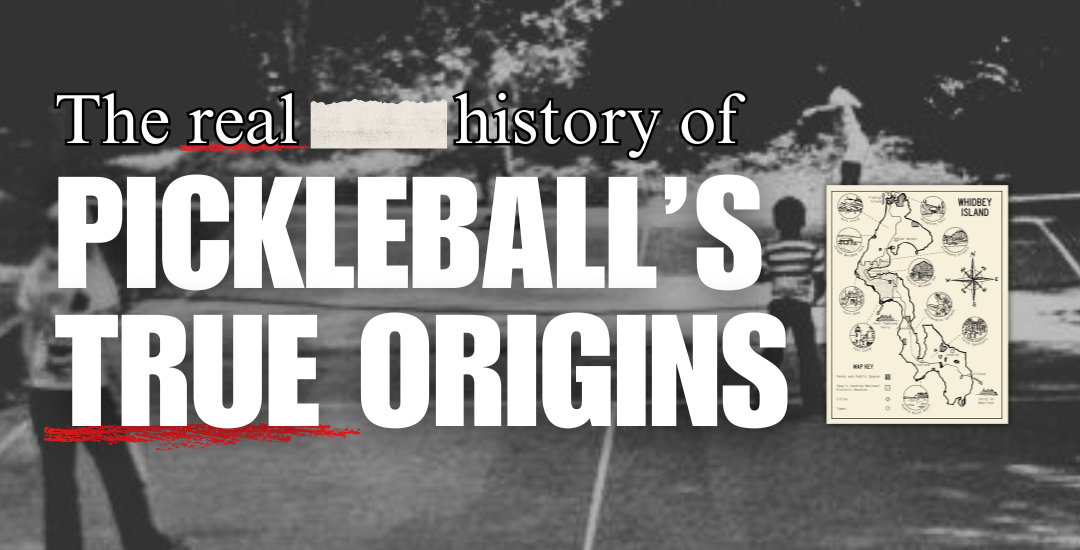
A self-published book claims the sport’s official history is all wrong — An Analysis
Investigating Feature
Every Sport Has a Genesis Myth—Pickleball’s Might Be Falling Apart
You can visit the birthplace of basketball in Springfield, Massachusetts, where James Naismith nailed a peach basket to a gym balcony. You can stand at Doubleday Field in Cooperstown, New York, where baseball was “allegedly” invented, despite historians agreeing the Doubleday myth is pure fiction.
And if you’re a pickleball purist, you can take a ferry to Bainbridge Island, Washington. There, nestled in a backyard, sits the original court where the game was reportedly invented in the summer of 1965 by Joel Pritchard, Bill Bell, and Barney McCallum. There's signage. A commemorative plaque. It’s a sacred pilgrimage for pickleball faithful.
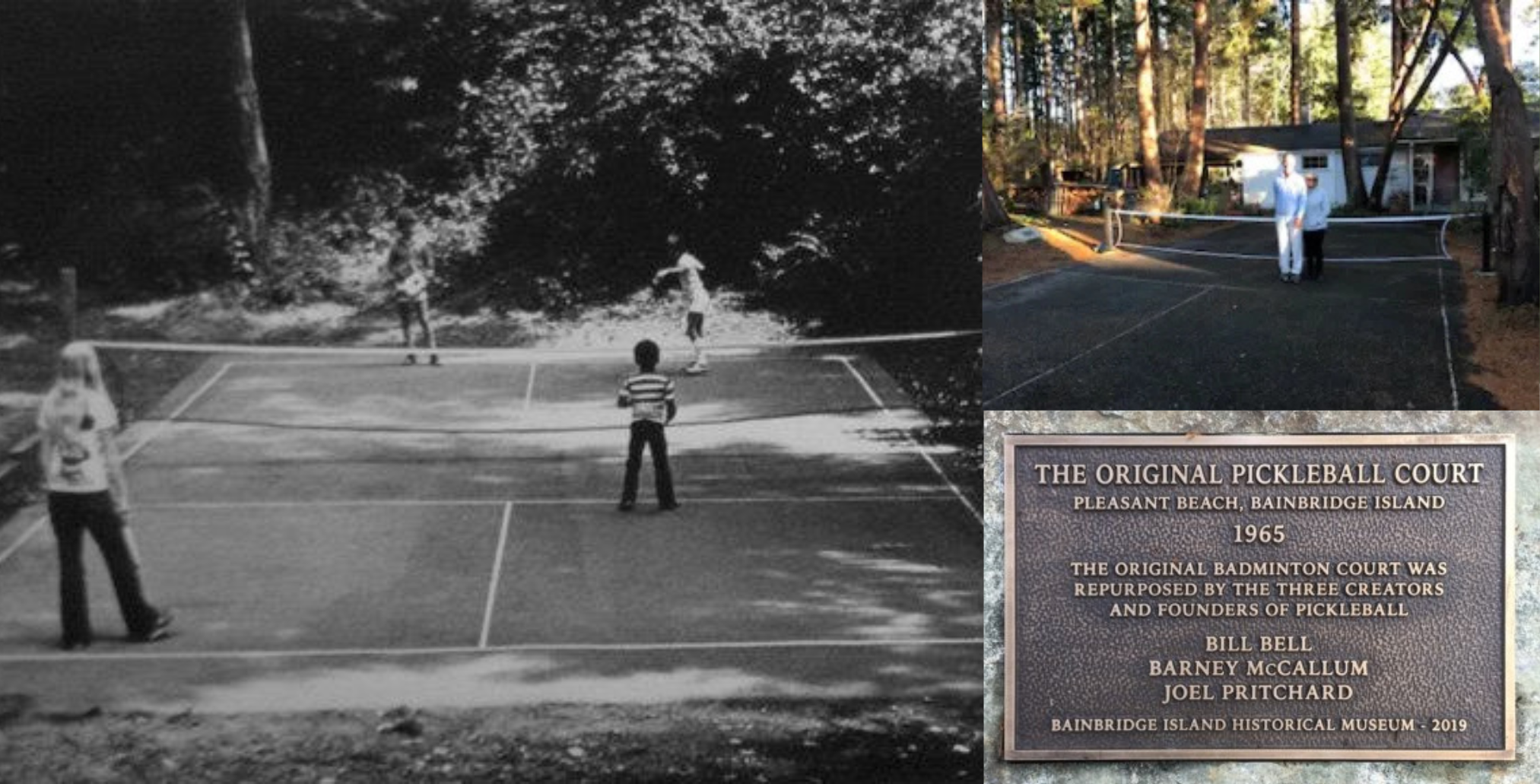
Until now, there’s been little reason to question it.
But recently, Thomas Shields, founder of The Dink and co-host of PicklePod, was digging through the corners of the internet when he stumbled across something bizarre—a self-published book that told a story he’d never heard before.
“I was like, wait a second. I texted Riley Newman to figure out if he knows anything about this,” Thomas said on the latest episode of PicklePod. “He said he has never heard anything about it.”
That, my friends, is curious, because the book claims the sport wasn’t invented on Bainbridge Island at all. It started further north—on Whidbey Island. You know, the one Riley Newman and Lindsey Newman are from. But even Riley, a top-ranked professional and native son of Whidbey, had never heard a whisper about this story.
Which begs the question: If this version of history is true, why has no one ever talked about it?
Bainbridge Island, 1965: The Officially Official Origin Story
To understand the controversy, we need to revisit the foundation of pickleball lore.
It’s the summer of 1965. Joel Pritchard, a member of the Washington House of Representatives (later a state senator and congressman), has just returned from golf with his friend, Bill Bell. They arrive at Pritchard’s home on Bainbridge Island, where their families are restless and bored. Looking for entertainment, they lower the net on the backyard badminton court, grab ping pong paddles, and improvise a game using a perforated plastic (wiffle) ball.
The game was fun. It caught on quickly. In the days that followed, their friend Barney McCallum joined in and began refining the rules. McCallum, a Seattle-area businessman and print shop owner, was instrumental in developing the first paddles and spreading the game to local neighborhoods and schools.
Together, the trio formalized the gameplay—double bounce rule, non-volley zone, underhand serves—and transformed it from a backyard pastime into a structured sport. By the 1970s, plywood paddles were being manufactured and distributed. In 1984, the first official rulebook was published. Pickleball had arrived.
The original court still stands on Bainbridge Island. It's referenced by organizations like USA Pickleball. You can find countless Facebook posts from pickleballers who made the trek to snap a picture next to the commemorative plaque. Local guides promote it. And for decades, it has been the undisputed ground zero of the sport.
That origin story isn’t just folklore—it’s institutional.
A Dog or a Boat? Let’s Talk About the Name
While most historians agree on who created the game, the origin of the name “pickleball” has always been more…debatable.
Theory 1: Pickles the Dog
This is the version most fans have heard. The Pritchard family reportedly had a dog named Pickles who enjoyed chasing stray balls during early backyard matches. As the story goes, someone jokingly called the game “Pickle’s Ball,” and the name stuck—eventually shortened to “Pickleball.”
It’s cute, family-friendly and memorable. But over the years, critics have noted timeline discrepancies. For example: was Pickles even around when the game was first played? Some reports suggest the dog came later, raising suspicions that the canine tale might’ve been retrofitted to fit the name.
Sometime between 1969 and the early 1970s, Joel was interviewed by a reporter from a national publication who was going to give the game some large-scale publicity. Joan and some of the neighbors were in attendance. Joel was asked where the name “pickle ball” came from. He told the reporter the true story about Joan’s naming the game from the pickle boats. He then proposed, as a fun story, the idea of writing that the game was named after the dog (by then a few years old). The reporter paused and said to go with the dog story since it was cuter and more memorable, and because the true story was a bit of a mouthful for the readers. The meeting was most likely the catalyst for the memories shared by neighbors who recalled being in the room when name discussions were being tossed around. - USA Pickleball
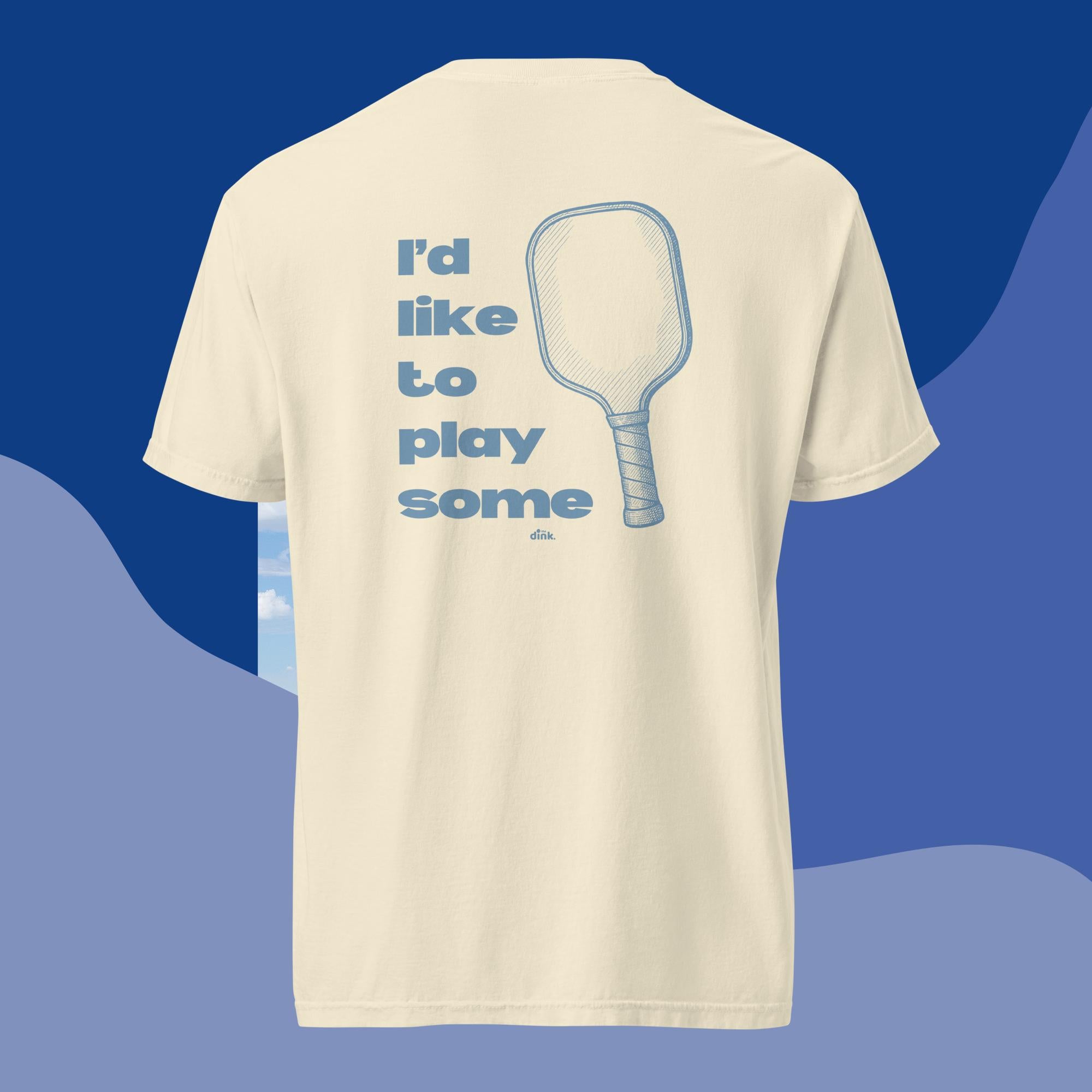
Theory 2: The Pickle Boat
This theory has more metaphorical weight. Joan Pritchard, Joel’s wife, publicly claimed that the name was inspired by “pickle boats”—a rowing term used to describe crews made up of leftover oarsmen from various other boats. Since the game of pickleball was a mashup of tennis, badminton, and ping pong, the analogy was fitting.
In her view, the game was the athletic equivalent of a pickle boat: a Franken-sport born from spare parts.
Both stories have their advocates. Both appear in official histories. But now, a third origin theory is challenging not just the name—but the entire foundation of the sport’s beginnings.
The Bechtel Theory: Booze, Brine, and a Different Island Entirely
The book in question is titled Pickleball!: The Curious History of Pickleball From Its Origins As Picklepong 1959–1963 by Patrick W. Smith.
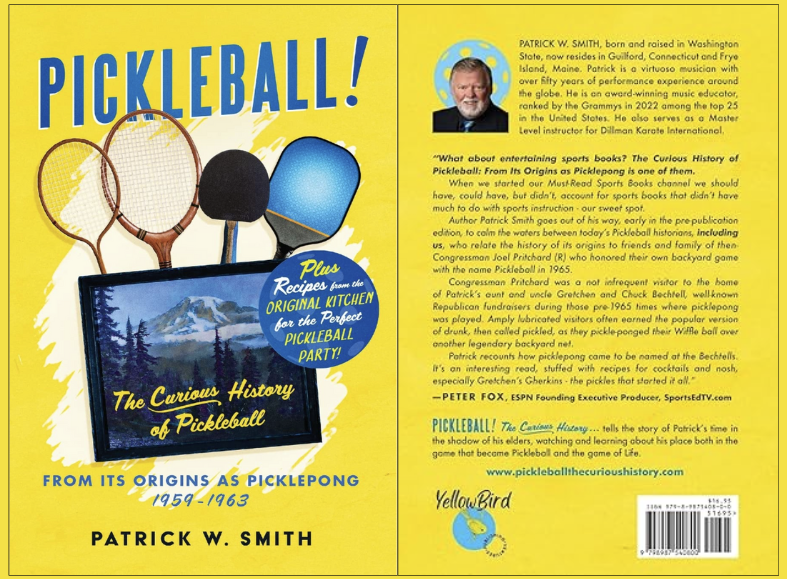
It was published on July 1, 2023. And before Shields stumbled across it, it was virtually unacknowledged—few reviews, no press mentions, no serious coverage within the pickleball community. That’s odd in and of itself. Especially considering what it claims.
According to the author Patrick Smith, pickleball wasn’t invented in 1965 on Bainbridge Island by the Pritchards and friends. It was actually invented years earlier—between 1959 and 1963—on Whidbey Island, just a ferry ride to the north, where he grew up playing a quirky backyard game with his family.
Smith writes that his aunt and uncle, Gretchen and Charles “Chuck” Bechtel, introduced the game to him as a child during his summer visits to the island. This is where the book's version of history collides with today's prevailing origin story.
The Bechtels used to host a variety of events and parties at their Whidbey Island home. In fact, they hosted a number of political fundraisers. These fundraisers, attended by notable Washington state politicians like Joel Pritchard, featured a casual lawn game involving ping pong paddles, a plastic ball, and a tattered badminton net.
That game? They called it “Picklepong.” Sometimes “Pickleball.”
“My purpose is not to challenge the veracity of the well-documented history of the facts,” Smith writes. “My purpose is instead to bring to light the angular backstory… Not only are [the Bechtels] my family, but also they are the actual progenitors of the game…”
He claims the game was discovered—not invented—by the Pritchards and McCallums at these fundraisers, and they later introduced it to Bainbridge Island, where they codified it and claimed it as their own.
Why “pickleball”? Smith’s answer diverges from both previous theories:
- Players were often intoxicated, or “pickled,” during the games.
- Gretchen Bechtel served homemade gherkins—tiny pickles—before every match.
“The Gherkin… was instrumental in the naming of the Whidbey Island game,” Smith writes. “My aunt ‘pickled’ the Gherkins herself from a very old family recipe, while the libations were provided by Dimple, Smirnoff, and The Rainier Brewing Company.”
But the most eyebrow-raising anecdote? Smith claims that the term "kitchen"—a staple in pickleball parlance—originated from Aunt Gretchen herself.
“Her husband would storm into the kitchen looking for a drink, and she’d yell, ‘Get out of my kitchen—I never serve in the kitchen!’” Shields recounted. “It became this running gag.”
It's a convenient anecdote, and if true, it means the most iconic term 'kitchen' may have started as a domestic squabble, not a gameplay rule.
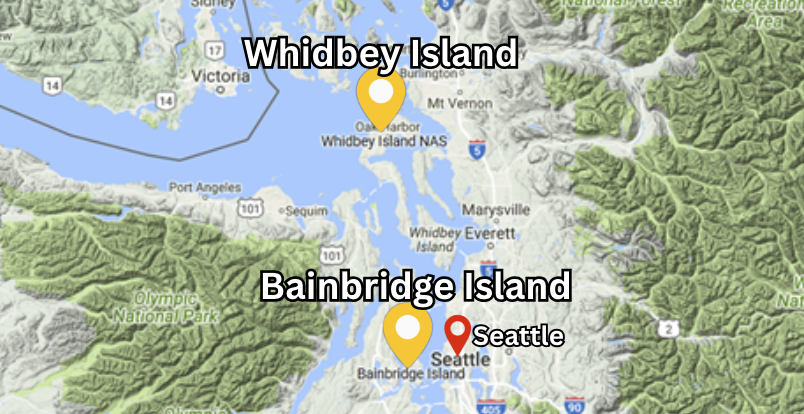
A Summary of Pickleball's Alleged True Origin:
- The birthplace is the Bechtel home on Whidbey Island around 1960, not the Pritchard's home on Bainbridge Island in 1965
- Pickleball was kind of a drinking game as participants were pickled, or tipsy, when they played
- The name is also rooted in actual pickles, or gherkins, that were a staple in the Bechtel household, often served before play
- The 'true' inventors, the Bechtels, held political fundraisers at their home, attended by politicians like Joel Pritchard, where 'picklepong' was played, suggesting the Pritchard's commandeered the game, as opposed to inventing it
Is it Believable?
Naturally, these claims have been met with skepticism—especially from those with a vested interest in the sport’s history.
PicklePod co-host Zane Navratil wasn’t buying it.
“Why come out with this now, instead of 20 years ago?” he asked. “He’s got to show us some evidence. Time-stamped photos. Documents. Something.”
Navratil makes a fair point. The book was published long after pickleball’s cultural moment hit. There’s no public paper trail. Even the people from Whidbey Island today—like Riley Newman—haven't heard of this supposed history.
But Shields isn't totally unconvinced.
Some of the anecdotes about the 'kitchen' and the Boeing material are oddly convenient, but generally it reads more like an authentic history than a story made up out of thin air to claim false credit for something.
Shields goes on:
If you're going to manufacture a story, you might as well make it as convincing as possible. And at that point, why not just claim the credit for yourself, or for your parents at least? But his aunt and uncle...what does he gain? Odd thing to fabricate.
Coincidence, Conspiracy, or Fan Fiction?
There’s something about the Bechtel Theory that feels authentic, and at times, too perfect. The author claims that Boeing materials were used for the grips of the original paddles. That sounds familiar, doesn't it? It's common knowledge that Boeing material was used for the creation of the first composite paddle, developed in the 1980s by Steve Paranto, whose father was a Boeing engineer. Strange coincidence?
The “kitchen” phrase? A charming story, but suspiciously retroactive given that the non-volley zone wasn’t even referred to as “the kitchen” until much later.
If the Bechtel Theory holds even a kernel of truth, it’s not just a footnote—it reframes everything we thought we knew.
The pickleball community reveres its founders. The court on Bainbridge is a near-sacred site. "Bainbridge" has made its way into the names of pickleball products and even the names of pickleball businesses. The sport has structured its identity around a trio of friendly tinkerers who birthed a game out of boredom.
Smith isn’t just proposing a new theory—he’s asking us to reconsider whose names get remembered in history, and why. But if Gretchen and Chuck Bechtel were truly the originators, then the official plaques, articles, and lore have all overlooked the real inventors.
Is it not possible that both histories are true? If the Bechtels never intended for the game to leave the backyard, pickleball would have lived and died on Whidbey Island, marooned for eternity. Without Pritchard, McCallum and Bell breathing life into 'picklepong', it likely never would have grown into America's, and possibly the world's, fastest growing sport.
In fact, in a later interview with Angelo Rossetti, Founder of Rossetti Brothers Pickleball, Smith seems to suggest this:
"The story I'm telling you is really the prehistory of what we now play. Joel Pritchard, Bill Bell and Barney McCallum invented what we're playing today, and were influenced by what they learned from us."
That feels more palatable, but even if the pickleball world agrees to adopt this new hybrid origin story, the nomenclature remains in discrepancy.
"The original game was named after my aunt's family's German gherkin pickle recipe," claims Smith.
So whether it be a dog, a boat, or actual pickles that inspired the name, we may never know for sure. I think I prefer it that way.

Now What?
The Dink has been put in touch with Patrick W. Smith and hopes to publish an interview soon. Stay tuned for more.
In the meantime, if you’ve got dusty paddles, grainy photos, or blurry 8mm footage of “Picklepong” on Whidbey Island, we want to see it. If you have corroborating or counter-evidence, we'd love to hear that, too.
Send your tips to: thedinkteam@heydink.com
The truth might just be hiding in someone's attic.
📘 Book Cited:
Smith, Patrick W. (2023). Pickleball!: The Curious History of Pickleball From Its Origins As Picklepong 1959–1963. Get a copy here.
🎧 Listen to the full PicklePod episode for the blow-by-blow discovery of the Bechtel Theory, Zane’s doubts, and Thomas’s incredulity in real time.
📍 Visit Bainbridge Island’s original court—or maybe take a detour to Whidbey. Who knows? You might just stumble across the real story.
Jamie Simon
Jamie is a 5.34 pickleballer from New York City. He is a rarity, with over 10 years of experience on the court. In addition to pickleball, Jamie follows Premier League Football and UFC.


